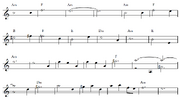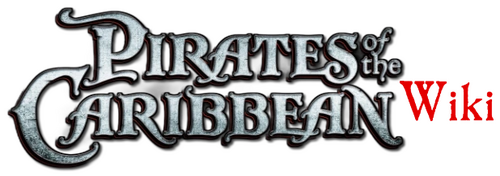| This article is about the soundtrack theme. You may be looking for the mermaid species. |

Album cover
"Mermaids" is a musical theme composed by Hans Zimmer and Eric Whitacre for Pirates of the Caribbean: On Stranger Tides. It appears on the film's complete soundtrack as track twenty-seven of track listing one and is 9:32 in length .
Track description[]

The theme for the mermaids adapted from "At Wit's End" and the new On Stranger Tides theme, as heard in "Mermaids"
Blackbeard's theme and the excerpt from "I Don't Think Now's The Best Time" as heard in "Mermaids".
The action variations on the themes from "Jack Sparrow" and "On Stranger Tides" as heard in "Mermaids".
The track begins with a dissonent sound sung by the mermaid choir, before moving into the mermaid theme adapted from "At Wit's End". This is stated twice, each time with a broken chord accompaniment on the harp. After a dissonant interlude, the piece state the theme from "On Stranger Tides", concluding the first half of the track.
The second half of the track is an action cue. It begin with an aggressive cello bassline based on a rising minor third falling down chromatically to the tonic, creating a four note semiquaver figure. Over the top of this the mermaid choir intones a rising scalic figure which becomes more discordant as the passage progresses. A lot of new action material is used that bears to semblence to the recurring themes of the soundtrack. Eventually the piece moves into a short action variation on Blackbeard's theme, before stating a short excerpt from the first half of "I Don't Think Now Is The Best Time", overlayed with Blackbeard's six-note tuplet pedal figure.
The third section begins by referencing the motor rhythm baseline from "The Kraken", most notably the triplet figure in the last beat of the bar. Blackbeard's theme is then heard again in a similar but slower variation to before. After more action material and a rising string crescendo the ation variation on the pirate theme - first heard in "Jack Sparrow" sounds, followed by a slow action variation on the theme from "On Stranger Tides", accompanied by a rising schromatic scale figure on strings. The section ends with a brief excerpt from "Wheel Of Fortune" and ambience from the mermaid choir.
The track finishes with a powerful statement of the Queen Anne's Revenge theme, followed again by Blackbeard's theme (with a slightly altered rhythm on the last two chords).
In the film[]
The first half is heard when Scrum sings to the mermaids to attract theme. The second half plays when the mermaids attack the sailors in the boat. The third section plays as the mermaids attack the crew of the Queen Anne' Revenge on land. The final statement of Blackbeard's themes accompanies the capture of Syrena.
Trivia[]
- This track is also known as "Mermaids Appear - Mermaids Attack" from the alternative track listing.
- At 9:32, this is the longest track on the album.
- The first half of the track is an abridged version of the first half of the track of the same name on the official album.
- The second section of this track is a slightly different version of the second section of the above mentioned track.
- The third section is not heard in the official release.
- The final statement of Blackbeard's themes are almost identical to the ending of the above mentioned track.
- This track is the second of two tracks to feature all of the themes for Blackbeard and the Queen Anne's Revenge.
- The opening of the third section is reminiscient of the adapted theme from Jaws heard in "The Kraken" (it is the same three note diminsihed figure). This is also true of the bassline; the last beat is grouped in three. This is the first time it has been heard since the second film.
- There are other similarites to "The Kraken"
- The adapted "mermaid theme" from At World's End and the new On Stranger Tides theme are very similar, and begin with the same three notes.
- The first half of the track is composed in A minor, despite Hans Zimmer writing almost exclusively in D minor. This may be evidence of Eric Whitacre's involvement.
- There is considerable use of synthesisers in this track, which were replaced by accoustic sounds in the final recording.
